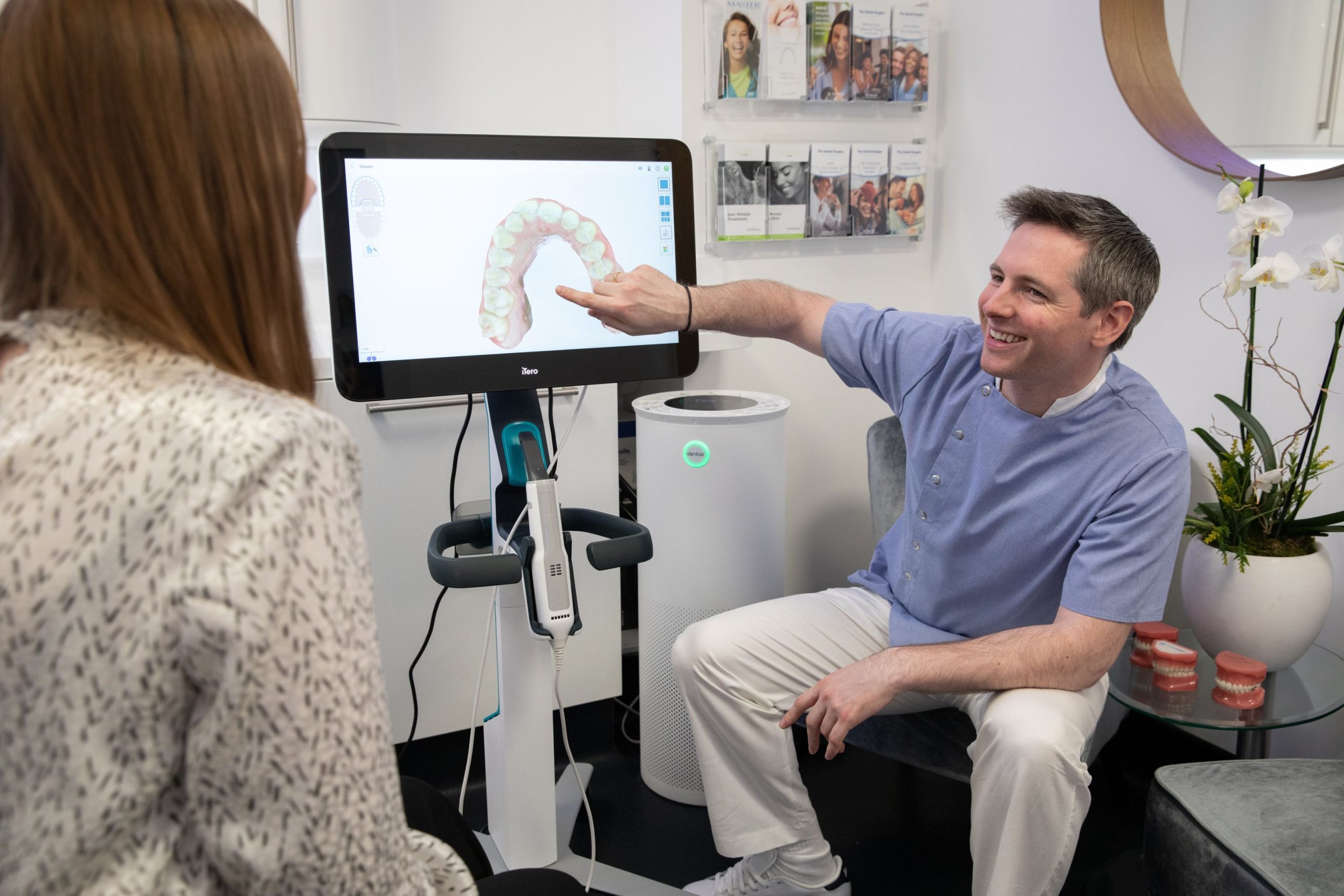- Categorised as:
- Dental Hygiene
- General Dentistry
- Periodontics
How serious is gum disease?
The link between oral inflammation, gum disease, periodontitis and systemic diseases has been mentioned time again via research journals and even news outlets. However, new research has shown a, new, direct link between gum disease and dementia. (Article here)
Gum disease and periodontitis is prevalent in many adults in the UK, with around 30% showing signs and symptoms and many of those presenting with more serious dental diseases.
Given this prevalence and the never-ending adverts for products that allegedly help alleviate gum problems, you might feel gum disease is a great lurking danger, and one which is hard to avoid.
Whilst the disease is serious and is linked to other diseases such as diabetes and heart conditions, it can be treated.
If most people have gum disease, and according to the NHS the majority of UK adults will experience the problem to some degree, how do you avoid it?
Unless you have a strong genetic disposition to gum disease, for most people, the disease can be managed and treated with a bit of brushing up on oral hygiene at home and regular visits to your dentist and hygienist.
Even if you have periodontitis (a more severe form of gum disease), you’re not alone and can still work towards healthy gums with the help of some expert care.
Top help, we’ve have divided this post into a few easy to digest chunks:
- What to do if you have gum disease
- What to avoid to maintain healthy gums
- The waring signs of gum problems
How to Take Care of Teeth and Gums at Home
Brushing
It is absolutely crucial to clean your teeth and gums effectively (using the proper techniques) and to maintain this habit, never missing the occasional brush or skimping on dental hygiene because you’re late for work.
You should brush your teeth twice a day with a good quality toothbrush, we recommend an electric toothbrush which delivers a level of cleaning that is difficult to replicate manually. An electric toothbrush both cleans more thoroughly and allows you to comfortably reach the backs of teeth which are often neglected with manual toothbrushes due to the size of the brush.
Brushing should be with a level of firmness that does not damage gums, brushing too hard with the wrong technique may lead to receding gums. Using an electric toothbrush with a pressure sensor can help you to avoid brushing too hard.
Many people mistakenly think that a brush with hard bristles must be better at cleaning, giving a more thorough clean than medium or soft bristles. In reality, “scrubbing” with a hard bristle brush could run the risk of traumatising the gums, eventually leading to recession. The aim is to brush and clean, not to scrub and scrape.
Flossing
At least once a day you should include flossing or the use of interdental brushes to clean between teeth and remove plaque that any toothbrush is going to struggle to reach.
There is a common misconception that flossing is only to remove food and if no food is dislodged with flossing that you don’t need to floss. In reality, flossing is most needed to remove plaque, not food!
Then there is mouthwash, mouthwash is not a substitute for brushing or flossing as it cannot get rid of the build-up of plaque. To use an analogy, using mouthwash instead of brushing or flossing is like throwing soapy water at your car and expecting it to be clean, it still needs to be washed by hand. Mouthwash can give the feeling of having cleaner teeth and freshen your breath temporarily, but it will not be doing much to actually facilitate the removal of plaque.
This might all feel like obvious advice and yet it is the key to healthy gums – problems often start from a seemingly small failure to maintain good dental hygiene.
Visit Your Dentist & Hygienist!
Although you can be on the lookout for signs and symptoms of gum problems, only an expert can diagnose with certainty what is common, early gum disease (gingivitis) and what is full onset gum disease (periodontitis) and advise the best course of treatment.
Regular check-ups ensure that any issues are caught early and, if there are no issues, you have that warm glow of a job well done.
It takes so little for gum problems to set in, but it is then all the more difficult to correct. A period of lax dental hygiene might create the onset of issues that a period of extra brushing won’t necessarily resolve as once plaque is hardened it cannot be removed at home.
What To Avoid If You Want Healthy Gums
Food
A research group headed by members of the King’s College London and the Natural History museum found that only 5% of adults had gum disease in the Roman era. This goes to show that although a good oral hygiene routine is crucial, this go hand in hand with other lifestyle factors that can have an impact on your oral health.
There are certain foods and drinks that have the potential to damage gums, these include foods high in sugar that can lead to inflammation. Sugar was thought to only affect cavities in teeth but new research shows it can cause inflammation in the gums.
Try to include some of the following anti-inflammatory foods in your diet to promote healthy tissue in your mouth:
- Ginger
- Cranberries
- Oily fish (tuna, sardines, salmon, mackerel)
One way to mitigate the damage is to work on food pairings – some food neutralises acid, chicken and lean beef for instance, so having these with acidic food reduces the damage done. As luck has it, we have covered the topic of food and drink to avoid to prevent gum disease already.
Smoking
Smoking is also to be avoided – we are not here to tell you to quit, but it is worth knowing the damage smoking imparts. Anyone who smokes a pack a day has six times the risk of suffering from gum disease! Once gum disease is present, smokers will take much longer to recover due to a hindered healing process.
You can read more on how smoking affects oral health here.
Stress
A final item to, if not avoid, at least be aware of, is stress. Stress has many health implications and a strong correlation to gum disease is just one of them. Is it possible to eradicate stress? Sadly not. However, at least be aware that in times of stress oral health can suffer, if nothing else try to maintain a good dental routine and avoid resorting to stress relief in the form of cigarettes, coffee and alcohol.
Soft tissue in the mouth tends to be a good indicator of dental health, ulcers can be a sign that stress is having a negative impact and that action may be required.
The Warning Signs of Gum Problems
You’ve got your dental hygiene routine sorted and your diet is as healthy as possible – now what?
How do you know if you might have gum problems?
The signs of gum problems are easy to detect.
- Do your gums bleed when you brush or floss?
- Do you have red or swollen gums?
- Are any of your teeth loose?
- Do you have bad breath that persists even through excellent oral hygiene and the removal or problematic foods?
- Is there a history of gum disease in your family?
Any one of the above could be a potential cause for further investigation. In fact, if you suspect you might have gum problems – and why else have you read 1,000 words to this point – then you should get the issue checked out.
It is one thing being able to spot the warning signs, what this doesn’t do is give you information on the nature of your gum problems or what is required to rectify the issue. The warning signs for Gingivitis and Periodontitis might appear roughly the same, certainly when checking at home, yet the treatment and damage done is very different.
The Role of the Professional in Gum Care
Your job at home is to maintain dental hygiene and to make sensible decisions relating to your diet and lifestyle. The job of your dentist and hygienist is to carry out regular checks and get a real insight into the state of your teeth and gums. It is only together that you can ensure you are looking after your oral health in the best way possible.
Gum Function
It is fairly easy not to give much thought to what holds our teeth in place, some people would say that this is the primary function of their gums but that is not the case – your teeth are held in place by the bone in your jaw which is only covered by a thin layer of gum. Periodontitis affects both the gums and the bones that support your teeth, only a dentist can check your bone levels by looking at your xrays.
Your hygienist will take a BPE (basic periodontal examination) score with each visit to check your gum health and conduct further comprehensive periodontal examinations when needed. Your trips to the dentist are like taking the car for its service, you might think everything is fine, but the expert spots that the tyres’ tread is low and the brake fluid needs replacing.
The Three Steps to Good Gum Health
Ultimately, all the above can be summarised in just three simply steps.
Maintain good oral hygiene.
Follow a healthy diet and lifestyle where possible.
Attend your regular check-ups and mention any concerns to your dentist and hygienist.
Follow these three steps and you will be on course for healthy gums – and you’ll be in the happy minority. If you have any concerns over your oral health, don’t hesitate to contact our team at The Dental Surgery in London.
Do you have a specific question?
Get in touch with us today.



